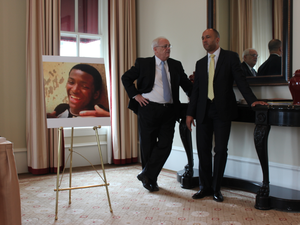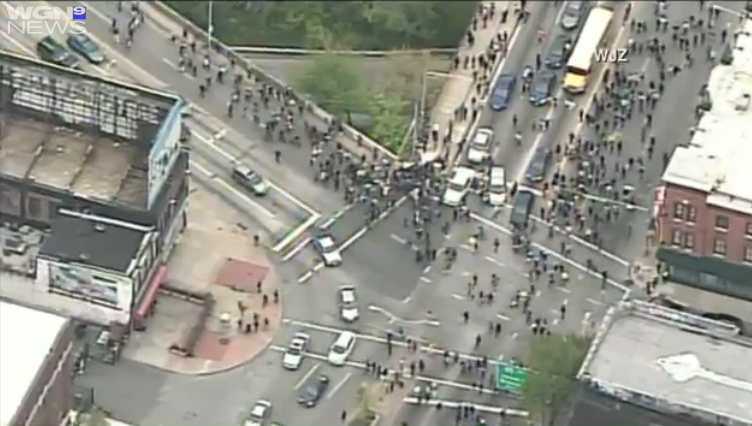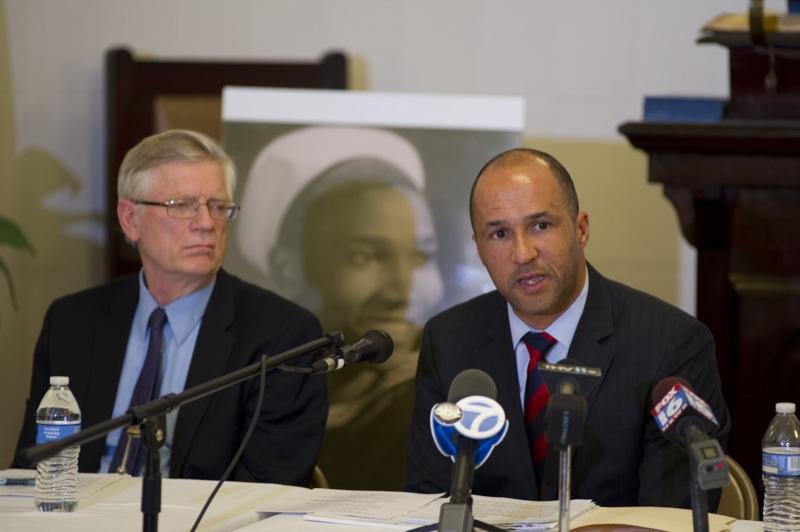LITTLE ROCK, AR – The father of a man shot and killed by police in 2008 is refiling his lawsuit against the police department, alleging fraudulent concealment on behalf of the department to hide the truth of what led to his son’s death.
On the morning of July 16, 2008, Little Rock Police Department officers arrived to Christina Hatfield’s home on Gillette Drive shortly before 11 a.m.
Dashcam video captures the drive up to the home, and through the audio you can hear officers approach Hatfield and ask if her daughter and Collin Spradling are at the home.
“I’ll go get them,” she tells officers.
The police respond, “We need to talk to them about an incident.”
The audio then goes silent, aside from bits and pieces of static, officers’ yells of shots fired and then the sound of women screaming. The audio doesn’t come back up, until the Hatfields are being escorted to police cars on the street.
The portions of audio missing, attorney Mike Laux argues, are the critical moments when 25-year-old Collin Spradling left the home and was shot and killed by police.
“During crucial portions of this event where the police are alleging they made certain warnings and certain statements – that portion is damaged ,” Laux said. “So, we can’t tell if those statements were ever made or warnings ever given and that’s a real problem that we all need to take a look at.”
The moments after Spradling was shot, are on the tape, including the sound of Paul Hatfield’s voice speaking to officers in the backyard and on the way to the police car.
“I’m not going to do anything I just want to know why you guys just killed someone in my —,” you hear Paul allegedly say before the audio crackles out.
Officers were at the Hatfield home following up on a complaint by a woman who said Spradling had burglarized her home, stealing a gun in the process. The woman was the mother of Spradling’s ex-girlfriend and alleged that she didn’t know who drove the getaway car, but that it was a woman driving a white Honda. Supposedly, the complainant later followed up with the police officer, saying the woman’s name was Rachel.
According to police and the Hatfields, Spradling walked out the back door where police officers were waiting. He was told to put his hands behind his back, and both Christina and Rachael Hatfield reported the officer told Spradling he knew why they were there.
According to the Hatfields, Spradling then rolled his right shoulder forward, as if resisting arrest, and that’s when officers took him to the ground.
According to both Rachael and Christina Hatfield, an officer immediately placed a gun to the back of Spradling’s head.
Officers claimed Spradling reached for a gun during the struggle.
“When they told him to put his hands behind his back he started fighting, and they took him down to the ground,” Officer Michael Lundy tells another police officer on scene in the dascham video following the shooting. “And he put his hands in his pants. He’s dead. They shot him.”
Witness statements that day, and in later depositions, contest those details.
“He’s on the ground, next thing I know he’s being unloaded on. That’s ridiculous,” a voice attributed to Paul Hatfield, and identified as himself in a deposition says. “I know he had a gun, man, I know he had a gun. but he’s [explicative] pinned to the ground, he’s got his arms behind his back, and it’d be really hard for him to aim at anything.”
According to Paul Hatfield, during a later deposition, he never saw Spradling with a gun that day, but had seen he had a gun the day before. According to Christina and Rachael Hatfield, Spradling had encouraged Rachael to get a gun because of the late hours she worked as a nurse in a rougher part of town.
When Christina Hatfield asked for the gun not to be in her home, Rachael said Spradling took the gun and placed it in the glove box of his vehicle, which was parked on the street. According to Rachael, he never retrieved it. According to Christina’s and Rachael’s testimony during depositions, neither of them ever saw a gun on or near Spradling at the time of the shooting or after.
The gun officers said they recovered, which they said they placed on a ledge in the yard for safety reasons, was the gun Spradling’s father had loaned him to show the Hatfields. According to the complaint, police never found the gun Spradling was accused of stealing.
Officers said they had shouted, “gun, gun” prior to shooting Spradling, and one officer reported asking if “they were sure”. According to Christina, Rachael and Paul, they never heard those statements from police.
In Laux’s 320-page complaint, he alleges a cover-up was underway within moments after the shooting. He points to the fact that officers told Christina Hatfield they had a warrant for her daughter and Spradling, when in fact they did not.
“Trying to serve a warrant for burglary and they got him to come out when he came out,” Officer Lundy says on the dashcam video to another officer.
Later in the tape, he reiterates that to Christina Hatfield, saying “there’s a warrant for her [Rachael]”.
The department later confirmed there was not a warrant, and told reporters that the officers were there to talk to Spradling and Rachael about the burglary complaint, not to arrest them.
“You have an unjustified police shooting, but more troublesome we’re alleging in the complaint is a patternistic, systemic attempt at covering up what happened,” Laux said.
Throughout the complaint, Laux alleges investigators and the department violated their own policies investigating the shooting, including failing to maintain crime scene logs properly and failure to separate the officers from one another after the shooting.
“That extends to witness statements that were disregarded, evidence that was compromised and damaged and evidence and videotapes withheld by the city despite Freedom of Information Act requests a long time ago,” Laux said.
Laux’s ultimate allegation against the police department is that a pattern of police misconduct was allowed to flourish and directly led to Spradling’s death.
“We allege if proper discipline had been implemented years before this incident, this incident very well would not have happened,” Laux said. “And everyone should care about that, because this case shows you don’t have to be some hardened criminal to have this happen to you.”
Laux’s case hinges on whether there is ample evidence that fraudulent concealment took place. If the judge decides there is not enough evidence that occurred, the statute of limitations has run out on the case. The statute of limitations had actually run on the case the first time it was filed in 2012. Laux asked for the case to be voluntarily dismissed, saying additional evidence had been provided by the city and he needed time to sort through it.
We reached out to City of Little Rock attorney Tom Carpenter to get his perspective on the complaint filed Friday. He was out of town, but aware of the complaint. We intend to follow up with him for an interview to gain the city’s perspective on what’s alleged in the lawsuit and what the city intends to do next.
The officers involved in the shooting were never charged by prosecutors, and the shooting was deemed justified. Rachael Hatfield was never charged with a crime in relation to the burglary accusation that led police to the Hatfield home.
Copyright 2015 Nexstar Broadcasting, Inc. All rights reserved. This material may not be published, broadcast, rewritten, or redistributed.
– Marci Manley, Arkansas Matters
View Full Article.





